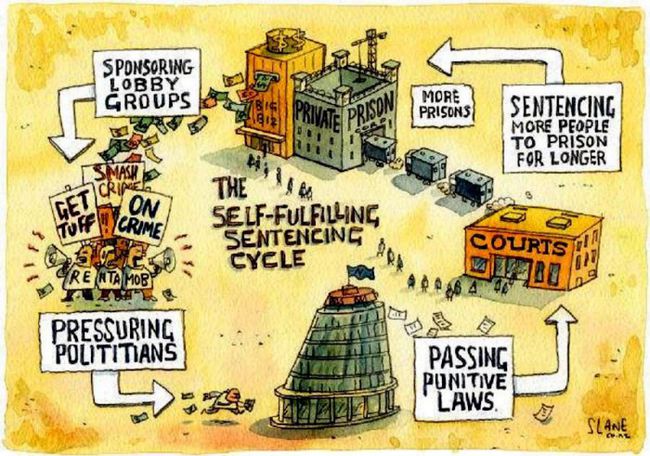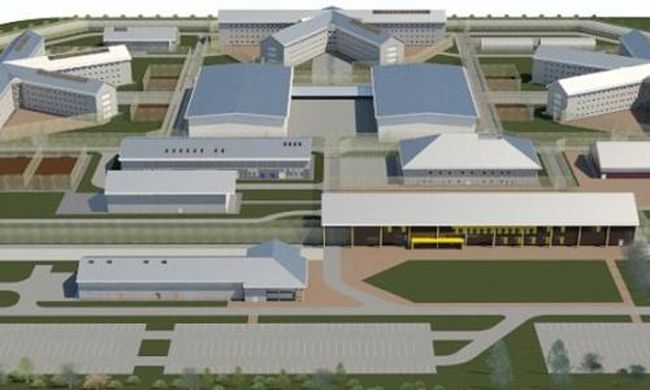15 Oct 2015
Nicole Vosper on seeing prisons as "one massive creative design opportunity"

When I went to the recent 2015 International Permaculture Convergence, one workshop I really wanted to go to was about permaculture and prisons. I couldn’t go though, as I had to be somewhere else. So I subsequently got in touch with Nicole Vosper, who led that workshop, and interviewed her instead! Nicole lives in Somerset, and runs a website called emptycagesdesign.org. As an ex-prisoner who is actively involved in permaculture, her work focuses on the bridge between the two. I started out by asking her why she feels that the prison system needs a rethink:
“I did a 3 ½ year prison sentence when I was 21. Twenty one months was in a private prison in Middlesex. That was in a backdrop of long-term organising for different social justice projects and campaigns and struggles.
My perspective on the prison system is that it’s inherently violent. Even with bigger cells or more adequate healthcare or more visits, or more education and training, or gardens in prisons, all these things that people throw around; even with all of those reforms I believe it’s inherently violent, because I believe that act of caging a human being is violent. Prison abolition, which is something I organise for, is about looking at what other solutions are there to the social and economic problems that the prison system is allegedly meant to be solving.
In what ways does the prison system, in your opinion, have unfairness designed into it fundamentally? Is it a fundamentally unfair design?
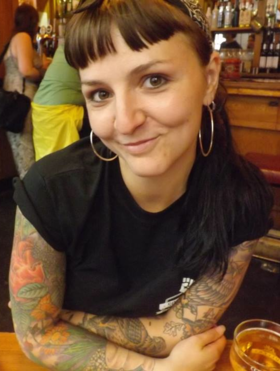 As a design, the prison system is incredibly effective in the sense of who it’s serving. It’s serving the State, and it’s also serving the hierarchies that exist in our society. Anyone who is engaged in any sort of social change work will probably see prison or repression as a limiting factor or a fear to overcome to push for more change. Prisons are fundamental to maintaining this social order in our society and they’re really essential to maintaining this class-based system that we have, especially in the UK.
As a design, the prison system is incredibly effective in the sense of who it’s serving. It’s serving the State, and it’s also serving the hierarchies that exist in our society. Anyone who is engaged in any sort of social change work will probably see prison or repression as a limiting factor or a fear to overcome to push for more change. Prisons are fundamental to maintaining this social order in our society and they’re really essential to maintaining this class-based system that we have, especially in the UK.
There’s an author called Karlene Faith who wrote a book called ‘Unruly Women’ about women in prison, and she describes prisons as places “where all the injustices converge”; so prisons perpetuate inequalities in the sense of race. People of colour are highly criminalised, have totally disproportionate sentences, especially foreign nationals and this new wave of – well it’s not new – racism towards immigrants. Immigrants are increasingly becoming criminalised and filling up our prison system. That’s no accident.
Prisons harm disproportionately queer, gay communities, the homeless, generally just the working class. The war on drugs and all these other things that the state holds as keeping us safe, the ‘us’ being this privileged minority, is actually false, and I feel that prisons are definitely perpetuating more harm than they are preventing or solving.
It’s quite a step from that to the idea of abolishing prisons altogether. Is there not an argument that actually prison keeps most people safe from some really violent, unpleasant characters; that there are some people for whom prison is a necessary thing?
I understand that prison abolition is a challenging perspective, especially if people are new to these issues. When I facilitate workshops around this field, I always ask people “what makes you feel safe?” “What keeps you safe, or your community safe?” The things that come out of those workshops, and these are workshops with all sorts of people: ex-prisoners, different community groups, even permaculture people at these conferences, the same pattern has come up again and again.
Access to healthcare, accountability if someone has experienced harm… If someone has experienced rape or abuse, or murder or violence then they need to feel some level of accountability with the perpetrator of that harm. Indigenous communities all over the world have managed to function without the use of huge state-run prisons. It’s a fallacy that we couldn’t organise our society without them.
I always bring it back to what keeps you safe, and most people say if they’ve experienced harm that they want a supportive group of friends around them. They want to have that communication with the perpetrator eventually. They want to feel immediately safe in their environment. So for me, the link between prisons and permaculture is actually redesigning our society and building communities that can really meet people’s needs so you don’t have people having to commit crime, using that discourse of crime to actually meet their own needs.
Most people in prison are there for economic reasons, or because their communities are criminalised. The criminalised communities that are in prison are the ones that are experiencing the most harm. So you chat to anyone in jail and they’re the ones that have experienced being mugged, being burgled, sexual and financial abuse, everything. It’s not really working for anyone. The people who experience the harm the most are the ones that are filling up our prisons.
You mentioned that you were in a private prison. One of the things that a lot of people listening to this might not be aware of is the extent to which the prison service is now a private commercial operation. Could you say a little bit about that and how that affects who prison serves and what the experience is for people on the inside?
This term the ‘Prison Industrial Complex’ has emerged in the last couple of decades to describe the more complex web of relationships that underpin the prison system. It’s never just been the state that runs prisons, but increasingly it is private companies that are running institutions. For example, all of the immigration detention centres in the UK are run for profit by private companies. What’s problematic about this isn’t just the ethics involved, actually profiting and serving your shareholders through caging certain groups of people; it’s also that the private prison industry have a lot of power and lobbying power so they can actually change our whole criminal justice system because they can put pressure to change different sentences and make reforms and stuff, so it changes the whole landscape of our criminal justice system.
In terms of private prisons, I’m not pro-state prison by any means at all, but there are definitely some differences and patterns. For example, of the top five prisons in the UK with the highest rates of self-harm last year, four of them were private prisons. You have this effect where companies are trying to cut corners because that’s their business interest and that obviously is going to affect prisoners, so that will reduce staffing ratios, making prisoners a lot more generally unsafe, higher levels of abuse between staff. In the prison I was in, 4 or 5 different officers had been sacked after I left for sleeping with women in the prison.
This level of abuse is rife in UK jails. There are obviously contracts with private companies that are directly profiting from the labour of prisoners, companies like Virgin or DHL, they are all making money by paying prisoners a maximum of £25 a week, and that’s a job that could have gone to someone on the outside for minimum wage or more. It’s completely shocking that they’ve created this system to profit from something that is so exploitative and harmful, and it is destroying communities by removing people from those communities. We’ve had horrific things of capitalist exploitation, war, everything else, but I do think there is something really screwed up about making money from actually caging people.
What, for you, would prison abolition look like? If people were guilty of violent crimes or whatever, what would be the ideal way of managing that, or treating that?
The most important thing is that there’s no one solution to anything. What would work for me or maybe my community wouldn’t necessarily work for another. So it’s about having this constellation of alternative strategies to respond to harm, just like indigenous cultures have got all variety of tools and community processes to respond to harm in their communities. We’d have to do that work and that design work and that practice and that development to actually be able to respond to these issues.
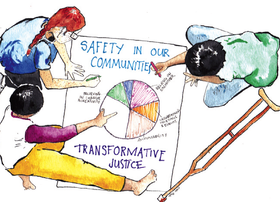 A lot of those tools already exist, especially in more anarchist subcultures. We have things like ‘safe spaces agreements’ and accountability processes. There’s a model that has come out of North America called ‘Transformative Justice’ which emerged due to the needs of survivors of sexual violence wanting to not endanger the perpetrators of that violence and subject them to the criminal justice system but actually to look at alternatives and to support them to transform their behaviour, so everyone is transformed by that process; it’s not just a case of restorative justice where you’re restoring the same power imbalances that perpetuate the harm.
A lot of those tools already exist, especially in more anarchist subcultures. We have things like ‘safe spaces agreements’ and accountability processes. There’s a model that has come out of North America called ‘Transformative Justice’ which emerged due to the needs of survivors of sexual violence wanting to not endanger the perpetrators of that violence and subject them to the criminal justice system but actually to look at alternatives and to support them to transform their behaviour, so everyone is transformed by that process; it’s not just a case of restorative justice where you’re restoring the same power imbalances that perpetuate the harm.
For me, prison abolition is one massive creative design opportunity of how can we keep our community safe, and what tools and processes can we imagine to respond to harm in a way that doesn’t give power to the state or lock people behind bars. In terms of this violent minority that we’re meant to really fear, that’s a big cultural myth that perpetuates this idea that prisons are natural, normal and necessary. I know there’s a book where the guy had spent time in Broadmoor as a psychiatrist working with five of the top serial killers in the UK. He said not a single one of them hadn’t had the most brutal, traumatic childhood.
So for me in terms of actually dealing with people that have perpetuated that level of harm, I think it needs to look more like a care model. I used to work with autistic adults, for example, that were quite violent and aggressive and it would be about what meets their needs. So I could imagine smaller systems where we actually treat individuals as needing care and support rather than needing more violence inflicted upon them.
Could you say a bit about where the permaculture comes in? Some people would think permaculture and prisons just means making gardens in prisons, but I get a sense from your work that you see it as a much deeper thing than just planting a few apple trees in the yard in the prison.
For sure. For me, permaculture and prisons have always been quite linked. I learnt about permaculture inside – I got a Distance Learning course when I was in prison and studied permaculture in there, worked in the gardens and encouraged the garden officer to let us grow veg rather than just weeding rose bushes. I’ve always seen that they do go together quite well in the sense that I see permaculture as being a way to completely redesign our society that meets human needs while increasing ecosystem health.
I get a lot of emails from people that want to do projects with prisons and plant gardens, but this isn’t really the work that I’m doing, or the work that I’m overly interested in. Being in the gardens in jail really kept me sane and really nourished me while I was there, but it’s a very cosmetic intervention. I feel that the power of permaculture gives us a lot more ability to transform society than we imagine at the moment.
So for me, it’s more about totally redesigning our societies from the ground up, which is obviously what people engaged with the Transition movement are doing and that’s super inspiring.
But I’m not dismissive of projects with prisoners. There are some really inspiring examples, especially in North America. People leaving prison really need support. They really need access to create a new way of life, because most people coming out of jail are landing straight in the same situation: poverty, benefits, drugs, violence, the same sort of patriarchal culture. So creating opportunities for prisoners to come out of jail and actually access land and build livelihoods, to find purpose and meaning, and actually be able to feed themselves, would be super inspiring and necessary.
I’ve met people who have been in and out of prison who actually will often get sent back to prison because it’s some stability. It’s regular meals, you’re warm, and I wonder what does that tell us about how crap stuff is once you get out and how little support there is when you get out, that going in and out and in and out just becomes a pattern for people. How do we break that pattern?
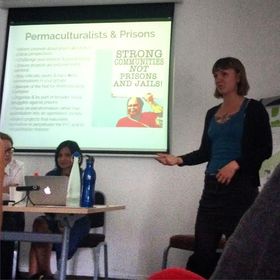 Without a doubt. Something like 65% of offenders – I don’t like the word offender – but of prisoners return within 6 or 12 months. So most people in prison are people that have been there before. There’s a design tool in permaculture, this idea of “a spiral of erosion”, identifying where that erosion is happening and where the leaks are. I feel like we can intervene in that system by looking at why people are returning to prison.
Without a doubt. Something like 65% of offenders – I don’t like the word offender – but of prisoners return within 6 or 12 months. So most people in prison are people that have been there before. There’s a design tool in permaculture, this idea of “a spiral of erosion”, identifying where that erosion is happening and where the leaks are. I feel like we can intervene in that system by looking at why people are returning to prison.
The main reason is getting kicked out of jail with a £46 discharge grant hasn’t changed in the last 4 years. Then you have to wait a month maybe to get your benefits sorted, and the grants from the state like the emergency fund from the Job Centre aren’t available any more. The Salvation Army is completely over-subscribed. You can’t get on the housing register and it’s literally no surprise that people return to prison. No surprise at all.
I could really see the change in the just-under 2 years that I was there, with all the government austerity measures, and how that was really harming people because all the services inside the prison were just getting stripped left, right and centre. The housing team lost their jobs, the group that worked with foreign national women lost their funding and then people were getting out and were completely unable to access support from charities or other bodies that used to exist. So prisons really link with this national impact of the state, and it’s basically class war on working class people in the UK.
Could you paint us a picture of what your vision would be of a fair, just, justice system? If you were to leap forward 20 years and this had happened, could you paint a picture of it for us? What might it be like?
For me, fairness is actual real social justice and a real egalitarian society, and I don’t feel that’s possible in our economic system and I don’t feel that’s possible when we have the existence of the state which is going to protect the people at the top of the hierarchy. So to have fairness would be to totally transform all our social relations and make our society less stratified and less hierarchical. Ideally, in my fantasy head, an anarchist society where we’re addressing our power relationships left, right and centre, where the minority don’t have a monopoly on violence over the majority.
In terms of a more positive, creative vision – it would be communities actually being less atomised and having relationships with each other, and people actually paying attention to things like sexism, racism, so that there aren’t such endemic levels of domestic violence or drug abuse. Most substance abuse comes from people being sexually abused when they were kids so if we actually had a revolutionarily different society that kind of harm hopefully wouldn’t happen, or at least in definitely wouldn’t happen at the levels that we have now.
So I can imagine a constellation of alternatives in communities developing different tools and when we don’t have the haves and the have-nots I’m sure that would definitely stop a lot of the crime as we know it happening.
How might we start to move towards what you’re talking about? We’re so far away from it at the moment.
We need to be investing time and energy into developing ways to respond to harm. Things like Transformative Justice are a lot more common in the US, but we need to really build up those tools and those ways of existing so that we can actually meet our own needs without the state. So I feel like that’s something that if people are interested in People Care or Zone 00 work or Inner Transition, then they could be actually really addressing some of the different forms of oppression that we have in our society like racism, sexism, able-ism and even just thinking about things like class within the Transition movement and the permaculture movement.
To me these feel like huge elephants in the room that we don’t discuss enough, so really looking at design interventions around them. Practical projects with ex-prisoners, I think is super important. If every permaculture project or community garden in the UK could support a couple of apprentice ex-prisoners, I think we’d definitely make some sort of dent.
But more than anything, it’s this idea of “are we making gardens in this battlefield?” I do feel like we need to politically engage with this and if people are really passionate about permaculture then applying design to grassroots campaigns. They’re building Europe’s second biggest prison right now in North Wales. Six days ago they announced a new prison they want to build in Jamaica funded by the British state. These are all things that are happening right now and I don’t feel like we can be neutral and I don’t feel like we can be passive. We need to organise and we need to resist the growth of the expansion of the prison system while simultaneously developing alternatives and doing more one-to-one work with ex-prisoners.
More information on Nicole’s work linking these issues here. She also suggested, for those interested in learning more, the following links:
Empty Cages Collective resources section
Community Action on Prison Expansion
Critical Resistance (North America)
